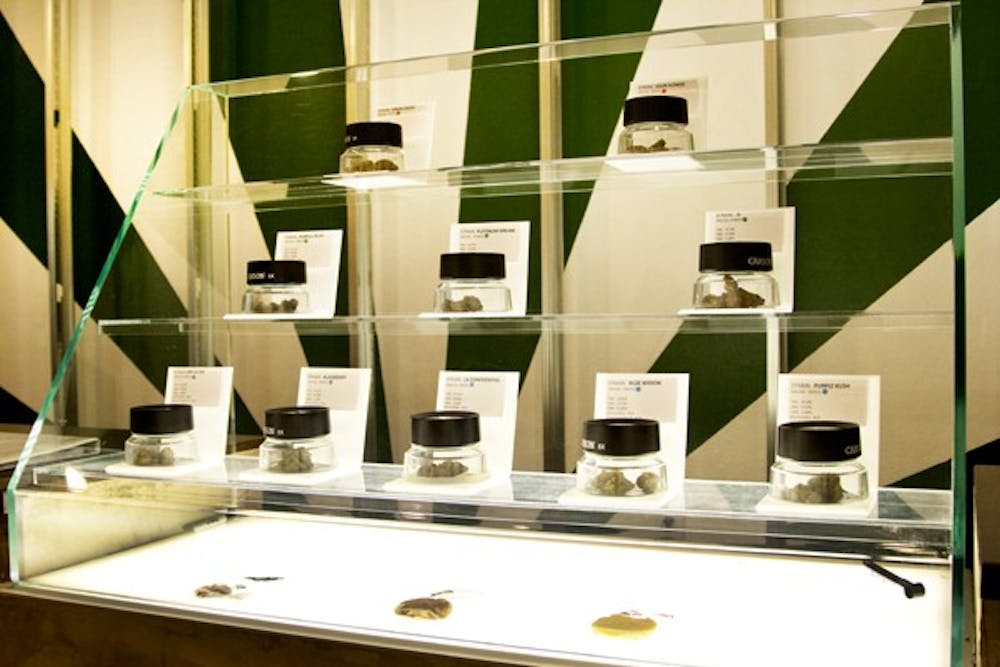 Arizona Organix in Glendale is the only medical marijuana distributor in the Phoenix area. The company tries to make clear that they are a distributor and not a club, like other businesses in the Phoenix area. (Photo by Ana Ramirez)
Arizona Organix in Glendale is the only medical marijuana distributor in the Phoenix area. The company tries to make clear that they are a distributor and not a club, like other businesses in the Phoenix area. (Photo by Ana Ramirez)Tempe residents are making progress in their efforts to establish the widespread distribution of medical marijuana, two years after Proposition 203, also known as the Arizona Medical Marijuana Act, which legalized the distribution of marijuana for medical purposes in November 2010.
ASU alumna Shiloh Danley, a clinical nurse practitioner, said she is barred from prescribing medical marijuana.
Although Arizona legalized the use of medical marijuana, it is still illegal under federal law. Because of the Drug Enforcement Administration's stance on marijuana, nurse practitioners can't prescribe it.
“The DEA is turning a blind eye to prescribers,” Danley said. “But legally, you can’t prescribe it.”
Danley said the DEA has raided and shut down marijuana providers in states that have legalized it, and the same thing could happen in Arizona.
Until then, applicants in Tempe will continue to work to open their dispensaries. Dispensary locations and the identities of their owners are confidential but will be provided to anyone who receives a qualifying patient's registry identification card.
In April 2011, the Arizona Department of Health Services began accepting applications for qualified patients and caregivers. Dispensaries have to pass through an extensive application process before they can open and operate.
First, there is a $5,000 application fee and a criminal background check. Then, applicants have to pass site examinations and be given an operating license. Finally, the ADHS performs a random selection process that grants a dispensary registration certificate to one applicant.
Dispensaries will be dispersed through the state using Community Health Analysis Areas based on population. There are 98 CHAAs in the state, and each one will have just one dispensary. The ADHS is only able to issue one dispensary registration certificate for every 10 pharmacy permits issued by the Arizona State Board of Pharmacy, according to its website.
Laura Oxley, spokeswoman for ADHS, said these stipulations were developed to reduce dispensary clustering.
“We developed CHAAs, so that all people in the state could receive marijuana if they qualified,” Oxley said.
Applicants for a dispensary registration certificate must prove they have access to at least $150,000 of capital. If more than one applicant in a single CHAA has received an operating license, ADHS performs the random selection process.
“We need to make sure they can stay in business,” Oxley said. “We are not receiving that capital.”
Tempe is divided into two CHAAs, Tempe S and Tempe N, and each will receive a dispensary. Multiple applicants in both of these areas received operating licenses, but there is not yet a dispensary open for business in Tempe.
For some medicinal marijuana distributors, the application process was too expensive. Chris Kessler, 31, who runs a medicinal marijuana club in downtown Tempe called Discount Depot, said the high overhead prices of starting a dispensary would force prices to rise significantly.
“People will continue to come to me,” Kessler said.
Arizona Revised Statutes Section 36-2811 allows a qualifying patient to distribute a legal amount of marijuana to another qualifying patient if there is no payment received in return.
Kessler encourages patients who visit Discount Depot to donate money to the farmers who supplied the marijuana. He does not grow any of the marijuana himself or accept any payments from the patients.
Kessler handed marijuana to a patient he said was dying of cancer and refused to take the money directly from the patient’s hand.
“I’m not just some dude selling weed,” Kessler said. “I’m here to help people get relief.”
Kessler said he has been arrested seven times for marijuana-related incidents but has been acquitted of all charges. Once, police raided his home, put him and others in the back of a police van and interrogated them. He was never able to recover the belongings taken from him that night and said he possessed a legal amount of marijuana.
“By their non-understanding of the law, they don’t know what to do,” Kessler said. “It forces us to go underground. I have to be afraid of the robbers and the cops.”
Arizona law requires a person legally cultivating marijuana, who doesn't own a dispensary, to do so 25 miles away from the nearest dispensary.
Kessler said his growers operate under Arizona law and said he has an agreement with the growers.
“They compensate me and make sure my rent and stuff is taken care of,” Kessler said.
Civil engineering junior Alan Proctor said cannabis clubs will be more effective in the delivery of medical marijuana than the dispensaries.
"In my opinion, dispensaries only monopolize the market and this creates a situation where the patients are paying a higher price, there is less product available and less outlets to get it from," Proctor said.
One concern with the dispensary system is the high cost of medical marijuana because of the expensive start-up fees.
"The higher the expenses to operate a legal dispensary are the more expensive the marijuana will be. Right now these cannabis clubs operate at an extremely low cost compared to what I expect of the dispensaries," Proctor said.
Reach the reporter at jwthrall@asu.edu or follow him @jthrall1




